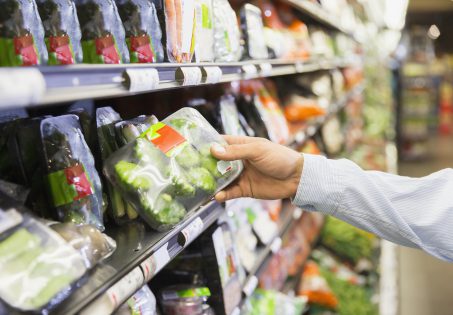In my previous blog I looked at the challenges of planning and forecasting in today’s fast-paced food and beverage manufacturing industry and how organizations were facing an increasingly disruptive environment. I’d now like to move onto technology and explore the ways it can help solve some of these issues and what manufacturers should expect from their ERP software providers.
The answer to greater agility is targeted technology
The pandemic’s effect on the supply chain has led to an acceleration of digital transformation across food and beverage manufacturers. Ranging from investments in digital commerce and omni-channel commerce solutions to be able to reach consumers anywhere, through to IoT, blockchain and analytics. Manufacturers need to leverage their investments to increase operational efficiency, drive transparency across the value chain, capitalize on innovation, and improve their responsiveness.
The latter is particularly critical for fresh food manufacturers, where the entire production process from raw materials to finished goods happens in a matter of a days, or even a single day. All due to the short shelf-life of these products.
When I speak with food and beverage manufacturers it always amazes me how “down to the minute”, some would say “last minute”, the planning process seems to be, leaving very little room for error. Picture the scene, it’s 6am and a production planner at a fresh food company receives an EDI from one of their retailers who needs them to deliver on the order by the end of the same day. Because this is fresh food, the planning process cannot start the day before. And the planner doesn’t only deal with one retailer, but a multitude of them. Does that sound familiar and is there anything you can do about it? Well at IFS we think there is…
By listening to our customers, we know that many of them are facing this exact challenge. As a result, we’ve recently added a new capability within IFS Cloud, giving manufacturers end-to-end visibility of the day’s planning process, all on one screen, making it possible to adjust the plan as required. We call it intraday planning and as I mentioned earlier, the idea came about through our client interactions, especially our advisory council
So how does intraday planning work?
When a planner starts their working day a number of questions are likely to be top of mind. Questions such as: “How can I best respond to any short turnaround orders that come in today? “How do I adjust supply to meet demand?” and finally, “What impact will my actions have further down the line?”. Not only does intraday planning help answer these critical questions, but it also pre-empts them.
To begin with, you can configure manufactured parts so that planning engines, like MRP (Material Requirements Planning) and DOP (Dynamic Order Processing), schedule manufacturing to finish on the same date as the order is required.
Another benefit is that short-term supply and demand can be balanced for ingredients, taking into consideration timings within the day, right down to the minute level.
Essentially, a planner can see and review the plan for the whole day, allowing them to quickly react or adjust the plan as and when needed. For instance, if they see a negative balance on an order, they can manually or automatically adjust the “needed by” date/time and lot size of a shop order to match the demand.
This kind of agility and responsiveness supports decision-making during compressed timescales, helping manufacturers drive bottom line growth, and increase customer service, whilst keeping production disruption to a minimum.

Digital transformation drives competition
Intraday planning is just one example of digital innovation offering a real solution to a very practical problem.
Another feature we have embedded lately to support food and beverage manufacturers is an AI-assisted weather forecast. The idea is to draw in external weather forecasts, applying algorithms to them, and essentially correlating these weather patterns with demand behaviours in the past to improve forecasting accuracy. This type of planning is especially relevant to those food and beverage companies who make products where demand is weather-dependent. For instance, salad, ice-cream or beer manufacturers, where their goods will be more in-demand during warm periods. But perhaps more importantly, companies can get a better prediction of what’s going to happen in the future – right down to the level of days – and plan accordingly.
The wider use of digital technology/transformation in today’s food and beverage environment is critical, not only from an agility and resilience perspective, but because it also drives competition in the market.
Think of brands such as Innocent Drinks or Gü, the dessert manufacturing company. Both of these came out of nowhere and became popular overnight. How did these companies do it? Sure, they were more creative with their sales and marketing strategies, but smaller, new players also tend to be digital natives. They don’t have all the technology complexity and legacy that tends to slow down larger organizations. In that respect, digital capabilities have helped lower the entry barriers for smaller players, meaning they can succeed in just a short amount of time.
Despite supply chain challenges in the food and beverage industry, the good news is that customer demand will continue to grow. But to keep up with the ever-accelerating change, coming at them from all angles, manufacturers need to invest in the right digital technology and skills. Increasing operational efficiency and reducing costs aren’t enough on their own to stay relevant in this market; it’s about leveraging digital capabilities to become more flexible, responsive, and intuitive – the ones that will help you overcome shortages, handle fluctuations, anticipate opportunities, and deal with any disruption in the future, whatever it might be!
Click here if you’d like to know more about IFS in Food & Beverage Manufacturing.
Do you have questions or comments, maybe you want to know more about intraday planning and how IFS is working with food and beverage manufacturers?
Please leave me a message in the comments below.